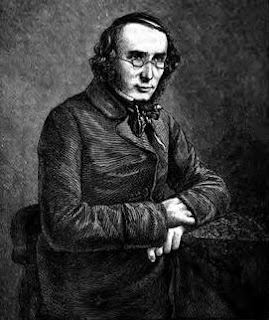 This day in 1862 marks the death of Jedediah V. Huntington: medical doctor, teacher, Episcopal priest, Catholic convert, novelist, and newspaper editor. Born to a blue-blood family whose ancestors included a Revolutionary War general, he studied at Yale and earned a medical degree from the University of Pennsylvania. In 1843, he was ordained an Epsicopal priest and served in Vermont. In 1849, he and his wife converted to Catholicism. Over the next twelve years he wrote four novels dealing with Catholic themes in a contemporary setting. A central theme of the novels is conversion to Catholicism. In his first novel, Lady Alice (1850), he writes about an English aristocrat who visits Italy and converts while she’s there. On the eve of the Civil War, Huntington was considered the premier American Catholic novelist. He’s largely forgotten now, and probably with good reason. But his works points to an important fact, that a notable number of antebellum Protestant men and women were converting to Catholicism, due in large part to the Oxford Movement in England. The Oxford Movement was an attempt by younger Anglican clergy, including John Henry Newman, to reassert their prophetic role, but it led many to cross over to Rome. Some of the main reasons that people gave for converting were: the aesthetic appeal of Catholicism and its sense of mystery; its rich traditions; the principle of apostolic succession and an authoritative voice; the balance between individual and communal. So even if they don’t hold up as novels anymore, Huntington’s books point to an important if overlooked aspect of antebellum Catholic life.
This day in 1862 marks the death of Jedediah V. Huntington: medical doctor, teacher, Episcopal priest, Catholic convert, novelist, and newspaper editor. Born to a blue-blood family whose ancestors included a Revolutionary War general, he studied at Yale and earned a medical degree from the University of Pennsylvania. In 1843, he was ordained an Epsicopal priest and served in Vermont. In 1849, he and his wife converted to Catholicism. Over the next twelve years he wrote four novels dealing with Catholic themes in a contemporary setting. A central theme of the novels is conversion to Catholicism. In his first novel, Lady Alice (1850), he writes about an English aristocrat who visits Italy and converts while she’s there. On the eve of the Civil War, Huntington was considered the premier American Catholic novelist. He’s largely forgotten now, and probably with good reason. But his works points to an important fact, that a notable number of antebellum Protestant men and women were converting to Catholicism, due in large part to the Oxford Movement in England. The Oxford Movement was an attempt by younger Anglican clergy, including John Henry Newman, to reassert their prophetic role, but it led many to cross over to Rome. Some of the main reasons that people gave for converting were: the aesthetic appeal of Catholicism and its sense of mystery; its rich traditions; the principle of apostolic succession and an authoritative voice; the balance between individual and communal. So even if they don’t hold up as novels anymore, Huntington’s books point to an important if overlooked aspect of antebellum Catholic life.











